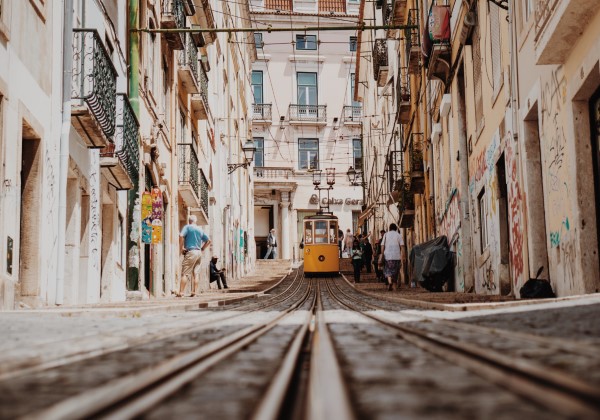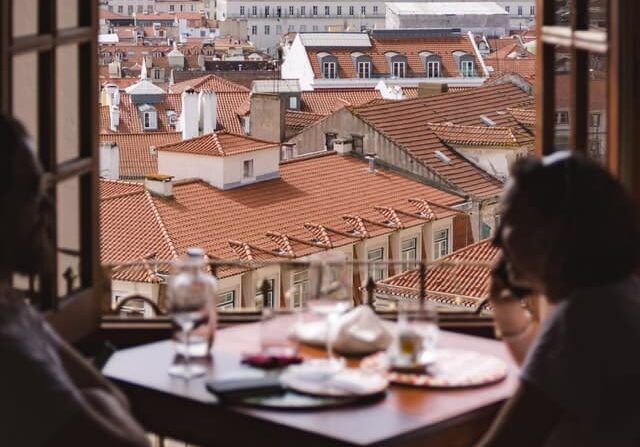Lisbon is a very affordable city compared to other European capitals, especially for digital nomads and retirees. The city’s fairly low cost of living attracts citizens from all over the world, but especially from the US and Western Europe, where living expenses tend to be considerably higher.
Whether you’re in the process of relocating to Lisbon or exploring your options, gaining insights into the city’s cost of living is essential. You should take various factors into account, including rental prices, healthcare expenses, and everyday costs.
That’s why we’ve created this comprehensive guide on the cost of living in Lisbon. In the sections below, we’ll give you a detailed overview of key expenses and consumer prices associated with life in the vibrant Portuguese capital.
Here’s what we’ll cover in this guide:
Is Lisbon an affordable city?

As the capital, Lisbon naturally comes with a higher price tag than other Portuguese cities. Despite this, the city offers exceptional value for money in various aspects. Public transport and dining out, for instance, are relatively affordable compared to other European capitals.
Additionally, Lisbon provides free primary education and boasts a great public healthcare system that is both accessible and economical for residents.
Ultimately, while certain expenses may be higher, the overall cost of living in Lisbon is influenced by individual situations and lifestyle choices.
Here’s a summary of the updated cost of living in Lisbon, Portugal, for 2025, based on information from Numbeo:
- A family of four estimated monthly costs: €2,530.0 without rent
- A single person’s estimated monthly costs: €714.6 without rent
Housing Costs in Lisbon
Buying property in Lisbon

Note that these are the average asking prices, and the transaction price can be either higher or lower than this. Lisbon has many different neighborhoods that each have their unique vibe and characteristics, with housing options for both families and single residents.
The average price will vary considerably depending on the neighborhood. To see more about the prices in different neighborhoods, you can consult our article on where to buy property in Lisbon.
Average rent prices in Lisbon: Estimated monthly costs
According to the latest data from Numbeo, when renting in Portugal, applicants can expect to pay an average rent for about €20 per m² per month for an apartment in Lisbon. To give you some indication, we’ll provide you with some price brackets below:
- A one-bedroom apartment in the city center – €1,429
- A three-bedroom apartment in the city center – €2,697
- A one-bedroom apartment outside the city center – €1,001
- A three-bedroom apartment outside the city center – €1,636
Again, the price for rental apartments will vary depending on which neighborhood you opt for, plus the size of the apartment, the age of the apartment, among other factors. Some apartments will include utility costs in the rental price; for others, you’ll be required to pay extra for them.
Cost of Everyday Expenses in Lisbon
Utilities
It is important to understand the average cost of utilities per month in order to gauge the cost of living in Lisbon. To give you an indication, basic utilities (electricity, heating, cooling, water, and garbage) for an 85m2 apartment will cost you around €115 per month. One minute of a prepaid mobile local tariff, without any discount or plan, will cost you €0.15. The monthly cost of internet (60 Mbps or more) is around €33.
Note that with utilities, this will depend greatly on your usage. One good thing about living in Lisbon is that the climate is very favorable, and for much of the year, you will not need to spend much on heating. However, the winters can be cold inside, so be prepared in advance.
Transportation

In terms of public transport, buses and the Metro are both inexpensive and the most popular ways to get around. The Metro, in particular, is a quicker and more convenient mode of public transport than when getting around by car, particularly during rush hour. A one-way ticket will cost you €1.50, and a monthly pass will cost you €40 at a regular price. You also have the iconic yellow Lisbon trams to get from place to place.
You can also get from city to city cheaply and, within cities, taxis are quite affordable. However, for significantly cheaper prices, Uber and Bolt will usually give you better deals.
Buying a mid range car, such as a Volkswagen Golf, is slightly more expensive in Portugal than in the States. If you run a car in Portugal, gasoline will cost you €2.03 per liter.
Cost of healthcare

This will include paying a visit to the emergency room, taking a diagnostics exam, or getting a particular doctor’s appointment. Routine checkups will also need to be included in the cost of living in Lisbon, with a medical exam typically costing around €40, while medical procedures begin at €5. Public healthcare is cheaper than private healthcare. However, private health is quite affordable, and many use it as a complement to the Portugal public healthcare system.
You will have to pay between €20 and €30 for a doctor’s appointment in a private healthcare facility. Private health insurance starts at a yearly fee of €400, with comprehensive healthcare cover costing around €1,000.
Cost of Food in Lisbon
Grocery prices

You’ll be happy to know that food is, in general, pretty affordable in Lisbon. If you factor into your budget between €300-€400 per month, you should be well within your limits as meat, fish, vegetables, and fresh fruit are all relatively inexpensive and of very good quality.
You’ll find much of the produce here is grown in the country. Try the oranges from the Algarve, the local cheeses, or the dourada fish and you’ll see firsthand the excellence of Portuguese fresh produce. If you’re looking to save money, it’s worth noting that shopping local is usually considerably cheaper.
Prices for daily essentials are shown below, with data from Numbeo:
Daily Essentials | Average Price |
Milk (regular), (1 liter) | €0.75 |
Loaf of white bread (500g) | €1.00 |
Rice (white), (1kg) | €1.02 |
Eggs (regular) (12) | €2.08 |
Local cheese (1kg) | €7.59 |
Chicken filets (1kg) | €4.94 |
Beef round (1kg) | €8.95 |
Apples (1kg) | €1.76 |
Banana (1kg) | €1.04 |
Oranges (1kg) | €1.26 |
Tomato (1kg) | €1.71 |
Bottle of wine (mid-range) | €4.00 |
Domestic beer (0.5-liter bottle) | €1.02 |
Imported Beer (0.33-liter bottle) | €1.89 |
Cost of restaurants and eating out in Lisbon
The best thing about eating out in Lisbon is that you’ll find all sorts of restaurants. As Portuguese people like to dine out and enjoy good food, this can be a great way to embrace the local culture and connect with your local community.
From small, traditional, family-owned restaurants called tascas that serve typical Portuguese foods, such as Bacalhau, grilled sardines, or an assortment of meat dishes, to higher-end luxury places. What’s more, the city now boasts a vibrant brunch scene, and there are hoards of international restaurants springing up all over town. Whatever you are looking for, depending on your minimum wage and disposable income, you are pretty sure to find it in Lisbon.
Meals can generally be as cheap, or as expensive, as you want. According to Numbeo, you can have a meal in an inexpensive restaurant for €10. However, we are pretty sure that you’ll be able to find a tasca where you can get a good lunch, coffee and dessert included, for around €7 or €8. A meal with wine at a mid range restaurant will cost closer to €20.
Note that for luxury restaurants you can expect to pay international prices. You will find several Michelin-starred restaurants in Lisbon, that are worth visiting if you are in the city.
Indeed, whether you are looking to find a relaxing coffee to head to start the day, a convenient lunch stop, or fancy trying some new cuisine, Lisbon will be able to cater to your wishes. Plus, new innovative restaurants are constantly springing up across the city.
Other Costs to Consider
Cost of leisure and entertainment

Movie theaters: You can catch the latest blockbusters at multiplexes such as Cinema City Alvalade, find independent gems at Cinemateca Portuguesa, a national film archive showcasing classics and world cinema. At unique venues like Black Cat Cinema add a touch of quirk, you can see cult classics and B-movies. No matter your taste, Lisbon’s diverse cinema prices are generally around €8 a ticket.
Concerts: Concert experiences in Lisbon cater to diverse taste buds and budgets. Small bars where rising stars and international talents rock the €10-€15 stage, or soak up the sun at free or affordable open-air concerts. Historic venues like Coliseu dos Recreios offer grandeur for €20-€30, while classical delights range from €15 chamber music recitals to symphony orchestras. From soul and electronic nights to traditional Fado, there are genre-specific experiences, often within the €15-€30 range. Festival day passes start at €20.
Sports events: A soccer game at Estádio da Luz, home to the legendary Benfica team, for tickets starting around €20-€30. You can also go to a Portuguese basketball game at Pavilhão João Lobo, where tickets typically hover in the same range. Beyond these major sports, Lisbon offers options for diverse athletic interests, from tennis tournaments and international rugby matches to adrenaline-pumping skateboarding contests and local running events.
Gym memberships: Monthly gym memberships typically cost €30-40 and offer access to state-of-the-art equipment and diverse workout options from cardio and strength training to yoga and swimming. While this is generally lower than in major European cities, remember that local salaries can also be lower. Lisbon offers a budget-friendly environment for fitness enthusiasts.
Childcare costs
Lisbon offers childcare options at various price points. Public daycare starts at around €200 per month, making it a budget-friendly choice for many families. If you seek more personalized care, private options climb to €500-€700.
Occasional outings are still manageable, with babysitting services ranging from €10-15 per hour. However, remember that availability and affordability can vary across the city, so research is key.
By exploring public and private options, you can find a childcare solution that fits your family’s needs and budget, allowing you to navigate Lisbon’s vibrant culture with peace of mind.
Educational costs
Public education is free for Portuguese citizens and legal residents of the country, and public schools in the country generally provide a good standard of education. However, if you opt for private education, then this will cost you between €800 and €1,500 per month for primary through to high school, not including book fees and enrollment fees.
You will also have the option to choose an international school in Lisbon. The capital has many outstanding options to choose from, which you can see in our article on International Schools in Portugal. The average fee is almost €1,500 a month, but this will vary from school to school. Again, enrollment feeds, books, and so on will be extra costs that you will need to factor in.
When it comes to universities, private universities are more expensive than public universities. Public universities have a fee limit that can change on an annual basis. In recent times, the maximum fee is almost €900. The fees are not the same as for private universities, however, whereby they will cost, on average, €3,000 per year. You will also find that the cost of living for students in Lisbon is often cheaper than in other countries.
Clothing and personal care costs
Lisbon’s fashion scene caters to your style and budget. Basic tops average €20-30, and jeans come in at a reasonable €50-€70, while footwear ranges from affordable €30 sneakers to pricier designer options, giving you diverse choices.
Personal care products generally fall within European averages. Remember, Lisbon’s cost of living is relative, so compare prices with local salaries to ensure comfortable living.
Extra costs
Miscellaneous expenses add to your overall living costs. Household essentials such as cleaning supplies and toiletries are generally on par with European averages. Occasional electronics purchases might be slightly pricier, so keep an eye on local deals.
Furnishing your home involves exploring flea markets and design stores, with lamps and rugs starting around €50-€100. When trying to calculate your estimated monthly costs, factor in the occasional weekend trip or unexpected appliance repair, and plan accordingly.
Remember, Lisbon’s affordability is relative, so compare costs with local salaries to ensure comfortable living. By being resourceful and embracing Lisbon’s unique charm, you can navigate miscellaneous expenses and make the most of your vibrant new home.
Cost of Living in Lisbon Compared to the US
The cost of living in Portugal vs USA has generally been considered more affordable. Lisbon’s cost of living is significantly lower than that of cities like New York, San Francisco, and Los Angeles. Expenses such as housing, transportation, and dining out at the best restaurants were often more budget-friendly in Lisbon. Additionally, health insurance costs and some other daily necessities tended to be less expensive.
According to Numbeo:
- Lisbon is 48.9% less expensive than New York (without rent)
- Rent in Lisbon is, on average, 65.3% lower than in New York.
It is worth acknowledging that average salaries tend to be higher in the United States compared to Portugal, including Lisbon. While the cost of living in Lisbon may be more affordable, this income disparity can influence the financial circumstances for expatriates or individuals transitioning between these two regions. Understanding these dynamics can be beneficial for anyone considering a move.
Cost of Living in Lisbon Compared to the UK
Lisbon is more affordable than many major cities in the United Kingdom, such as London, Edinburgh, or Manchester. Housing, transportation, and certain daily expenses are often more economical in Lisbon.
Again, average salaries in the United Kingdom are typically higher than those in Portugal, including Lisbon. While the cost of living may be lower in Lisbon, the income disparity can impact the overall financial dynamics for expatriates or individuals moving between the two locations.
Below is a comparison between the cost of living in Lisbon and London, according to Numbeo:
- Consumer prices, including rent, in Lisbon are 43.2 percent lower than in London
- Rent prices in Lisbon are 50.6 percent lower than in London
- Restaurant prices in Lisbon are 42.1 percent lower than in London
- Groceries prices in Lisbon are 29.8 percent lower than in London
How to Move to Lisbon, Portugal
Living in Lisbon is an appealing prospect due to its affordability and diverse visa options. Among the notable choices are the Golden Visa and the D7 Visa, both offering attractive pathways for individuals looking to immerse themselves in the vibrant lifestyle of Lisbon. These visa options provide unique opportunities, whether through investment or demonstrating financial means, making the process accessible for those seeking to call Lisbon their new home.
Portugal Golden Visa

Here are the investment options available for the Portugal Golden Visa:
- Fund subscription: Make a contribution to a Portugal Golden Visa investment fund worth at least €500,000
- Investment or donation in the arts or reconstruction of national heritage with a donation of at least €250,000, which is also relevant to Portugal’s Cultural Production Golden Visa.
- Scientific Research: Science or Technology research contribution of at least €500,000
- Creation of ten jobs: Creation and maintenance of ten jobs during the required period
- Share capital and job creation: Incorporation of a company or reinforcement of a company’s share capital, in either case with an investment of €500,000, combined with the creation of five or maintaining ten jobs (five of them permanent)
D7 Visa Portugal
The Portugal D7 Visa is an affordable and attractive visa that allows non-EU citizens to obtain Portuguese residency as long as they have sufficient funds and passive income to sustain themselves during their stay in Portugal.
Retirees, entrepreneurs, or other expats who are living off a recognized stable income can apply for the D7 Visa. A recognized stable income includes movable property, real estate, intellectual property, pensions, or financial investments. To qualify, you’ll need to earn a minimum wage, which is dictated by the Portuguese Government.
Exploring Visa and Immigration Options for Portugal
If you're considering making the move to Portugal, it's essential to be informed about the various visa and residency options available. The Golden Visa Portugal program is an attractive option for many, offering residency to investors and their families. For those eyeing retirement in this beautiful country, the Portugal D7 Visa is tailored for you. Digital nomads can take advantage of both short and long-stay options with the Digital Nomad Visa (D8).
For the entrepreneurial spirit, Portugal offers the Entrepreneurship/startup Visa (D2) - Start-up Visa (open company) tailored for those looking to establish their businesses in the country. Those with specialized skills can explore the Work visa for highly qualified employees (D3). Additionally, if you have Portuguese ancestry, you might be eligible for Citizenship by descent.
However, moving to a new country isn't just about visas. If you're thinking of buying property, our guide on Buying Property in Portugal can offer invaluable insights. Dive deeper into the immigration process with our comprehensive Portugal immigration guide. For Americans specifically looking to relocate, we have curated information on Americans moving to Portugal. Lastly, one can't forget the importance of the NIF (Tax Identification Number), a crucial step in any relocation process.
Frequently Asked Questions about the Cost of Living in Lisbon
How much money do you need to live comfortably in Lisbon, Portugal?
For a family of four estimated monthly costs are approximately €2,045 without rent. The estimated monthly costs for a single person are €582 without rent. The cost of living in Lisbon for a couple will be something in between.
Living expenses without rent are approximately €700 per month for a single person. Including rent, the monthly expenses range from €1,230 for renting a room in Lisbon to €2,480 for renting a one-bedroom apartment in Lisbon.
Is it expensive to live in Lisbon?
While Lisbon is the most expensive city in Portugal, it remains quite affordable compared to other Western European capitals. The cost of living in Lisbon is generally manageable for international students, digital nomads, retirees, and expats.
Although Lisbon is one of the most affordable cities in Western Europe, it is important to note that the average salary in Lisbon is lower than that of other European cities. This affordability makes Lisbon an attractive option for those looking to save money while enjoying a high quality of life.
Is Lisbon a good place to live?
Lisbon is one of the best cities for expats and digital nomads, offering a relatively low cost of living, high quality of life, and a welcoming environment. The city provides excellent international schools, good healthcare, and extensive public transport, making it an attractive option for many.
How does the cost of living in Lisbon compare to living in major cities in other countries in Western Europe?
Compared to many major Western European cities, Lisbon offers a good level of affordability. Costs stay well below the cities in Western Europe, such as London, Paris, and Amsterdam and US cities, such as New York, often slipping even under Madrid and Barcelona.
Like any other capital city, Lisbon has its own price range, which makes living there more expensive than living in other cities in the country, but it offers a comfortable standard of middle class living without breaking the bank.
How much is rent in Lisbon city center?
Studios in the center of Lisbon typically start around €600, depending on the square meter count, and whether it’s a large or small apartment. In trendier areas, such as Chiado, you can expect to pay rent upwards of €800.




